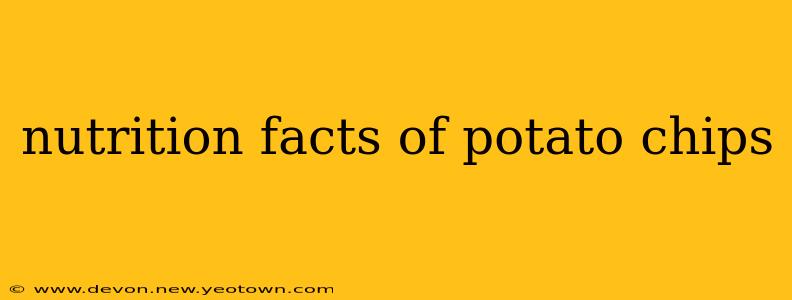Let's be honest, potato chips are a guilty pleasure for many. That satisfying crunch, the salty flavor… it's hard to resist. But beneath that delicious exterior lies a nutritional profile that's worth understanding. This isn't about demonizing chips, but about making informed choices. We'll explore the nutritional facts of potato chips, addressing common questions and offering insights into healthier alternatives.
What are the main nutritional components of potato chips?
The nutritional makeup of potato chips varies significantly depending on the brand, type (e.g., regular, ruffled, kettle-cooked), and ingredients. However, some common components include:
- Carbohydrates: Potatoes are primarily composed of carbohydrates, and this remains true in chip form. These carbs provide quick energy but can also contribute to blood sugar spikes if consumed in large quantities.
- Fat: Potato chips are notoriously high in fat, often from vegetable oils used in the frying process. The type of oil used can influence the overall fat profile, with some oils containing higher levels of unsaturated fats than others.
- Sodium: Salt is a key ingredient in most potato chips, contributing significantly to their salty flavor. High sodium intake is linked to various health concerns, including high blood pressure.
- Protein: Potato chips provide relatively little protein.
- Fiber: While potatoes contain some fiber, the frying process and removal of the potato skin often result in lower fiber content in chips.
How many calories are in a serving of potato chips?
A typical serving size (about 1 ounce or roughly 15-20 chips) can range from 150 to 170 calories, but this varies widely depending on the brand and type. It's crucial to check the nutrition label on the specific bag you’re consuming. Remember that a "serving size" is often much smaller than the amount people actually eat in one sitting.
Are potato chips healthy?
This is a complex question with no simple yes or no answer. In moderation, potato chips aren't necessarily unhealthy, but they shouldn't form a significant part of a balanced diet. Their high fat, sodium, and carbohydrate content means they should be consumed sparingly. Focusing on portion control is key.
What are the health risks associated with eating too many potato chips?
Consuming excessive amounts of potato chips can contribute to several health issues, including:
- Weight gain: The high calorie and fat content can lead to weight gain if consumed regularly in large quantities.
- High blood pressure: The high sodium content can contribute to elevated blood pressure.
- Increased cholesterol levels: The type and amount of fat can influence cholesterol levels.
- Type 2 diabetes: The high carbohydrate content can impact blood sugar regulation.
What are some healthier alternatives to potato chips?
If you crave that satisfying crunch, there are healthier alternatives:
- Baked potato chips: These often contain fewer calories and fat than fried chips.
- Vegetable chips: Sweet potato chips, kale chips, or beet chips offer a more nutrient-rich alternative.
- Popcorn: Air-popped popcorn is a whole-grain snack that’s low in calories and high in fiber.
- Fruits and vegetables: Fresh fruits and vegetables offer a naturally delicious and healthy snack option.
Are there any nutritional benefits to potato chips?
While not a significant source of essential nutrients, potato chips do provide some potassium and small amounts of vitamin C, but these benefits are far outweighed by their negative aspects when consumed in excess.
Ultimately, enjoying potato chips occasionally as part of a balanced diet isn't necessarily detrimental. The key is moderation and mindful consumption. By understanding the nutritional facts and making informed choices, you can enjoy your favorite crunchy snack without compromising your health goals. Remember to always check the specific nutrition label on the packaging for the most accurate information.

